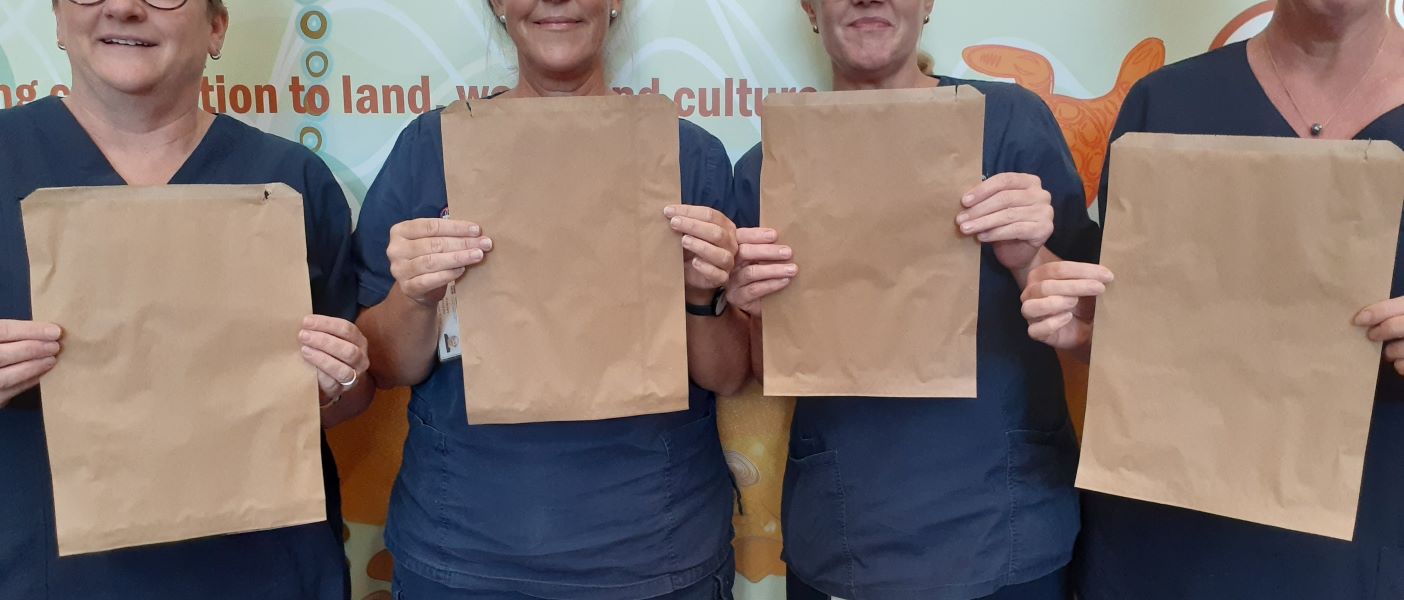Put A Stop To Plastic Bags
Seven Community Nursing teams from the Greater Newcastle Sector worked with HNELHD Procurement, Infection Control and Wound Management teams to eradicate the use of 22,850 single use zip lock plastic bags across their service each year.
The phasing out of problematic plastics as per the NSW Plastics Action Plan prompted a group of like minded community nurses to review current single use plastic usage. Given the recent single use plastic bag ban across NSW, it was decided that focusing on single use zip lock plastic bags would be a quick sustainable win for the service. Prior to the project, Community Nurses across Greater Newcastle Sector were utilising single use zip lock plastic bags for the following reasons:
- To organise clinical supplies into individual patient ‘packs’ each day,
- To transport the clinical supplies from the clinic to a patient’s home,
- To store open but unused medical consumable products in a patient’s home between visits; and
- To manage waste in a patient’s home.
Staff surveys were conducted to establish current practice and gather ideas on alternative solutions. Considerations for alternative solutions included:
- Cost neutrality,
- Availability via a statewide procurement contract and stocked in the OneLink Warehouse given the cost and carbon implications of ordering products off contract,
- Counter productivity of moving to a reusable solution that would require regular cleaning with single use universal wipes; and
- Complexity of the composition of single use plastic bag alternatives labelled as ‘degradable’, ‘biodegradable’ or ‘compostable’.
The team also gathered consumer feedback to ascertain current views on the impact of their healthcare upon the environment and gauge their interest in minimising the waste associated with their treatment.
The decision to transition from single use zip lock plastic bags to single use paper bags to organise clinical supplies into individual patient packs each day and to transport the clinical supplies form the clinic to a patient’s home was based on the following:
- Rapid Change: Paper bags were readily available via the statewide procurement contract and stocked in the Onelink Warehouse,
- Cost: The price of paper bags was equal to that of the single use zip lock plastic bags,
- Disposal: Paper bags can be recycled in a patient’s co-mingled recycling bin at home; and
- Size: The smaller size of the paper bag helped to reduce staff overpacking supplies and therefore mitigate excess wastage.
To manage the storage of open but unused medical consumable products in a patient’s home between visits, patients were asked to provide a clean reusable plastic container for the duration of their treatment plan. Before placing any open but unused products in this plastic container, the nurse cleaned the reusable plastic container with a single use universal wipe. As per previous practice, nursing staff conducted a risk assessment and exercised their clinical judgement to determine if it was appropriate to use the open but unused medical consumable product.
In the 12 months prior to implementation, procurement data demonstrated that 22,850 single use zip lock plastic bags were ordered by the community nursing teams across the Greater Newcastle Sector. Since implementation of the project, no single use zip lock plastic bags have been procured. The Sustainability Project Team are now planning to scale this project up and eradicate single use zip lock plastic bags across all Community Nursing teams in the district.
The results of the consumer feedback surveys suggested that 74% of patient’s had an interest in improving the sustainability of their healthcare. Commentary collected from the consumer feedback surveys:
“There is a lot of waste for 10 minutes of drain care twice a week.”
“All of the products used on me come in plastic… Why can’t all of this plastic be recycled?”
“Can recyclable products be used for care? Can you use less packaging, less gloves?”
Promisingly, the Put A Stop To Plastic Bags project has been a catalyst for the community nursing teams across the Greater Newcastle Sector to explore other sustainable changes to their practice. A staff evaluation survey was conducted at the end of the trial period and 60% of clinicians reported that the project has added a ‘sustainability lens’ to their practice. Commentary on changes to practice collected from the staff evaluation surveys:
“Being mindful of waste and not packing items that may not be needed.”
“Improvising with simple products to reduce waste and cost, for example not opening a whole dressing pack if I only need a bluey.”
“I’m questioning excess packaging on the products we use.”
Infection Prevention and Control Practice Handbook (nsw.gov.au)
Infection Prevention and Control in Healthcare Settings (nsw.gov.au)
If you have any questions relating to the Putting A Stop To Plastic Bags Project please contact:
HNELHD Nurse Unit Manager Nelson Bay Community Health Centre /Sustainability Champion: Stacey Diana at Stacey.Diana@health.nsw.gov.au
HNELHD Sustainability Project Officer: Alana Stoeger at Alana.Stoeger@health.nsw.gov.au
If you have any questions relating to the HNELHD Sustainability Strategy or other Sustainability Projects please don’t hesitate to contact:
HNELHD Sustainability Project Team at HNELHD-SustainableHealthcare2030@health.nsw.gov.au

